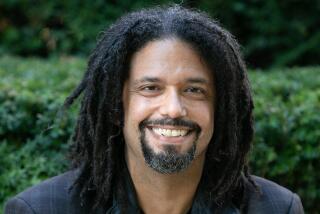Germany’s Past Always an Issue
- Share via
BERLIN — Although the United States soccer team begins World Cup play almost 300 miles away today, any American sports journey to Germany must start here, at the site where Jesse Owens sprinted and jumped his way to one of the greatest combinations of athletic achievement and social commentary.
Even when Berlin’s Olympic Stadium is silent, as it was Sunday, the place once shared by two men who represented the best and worst of human qualities can capture the contrasts of this humongous sporting event, where the clashes between optimism and fear, the past and the present might as well be listed on the daily schedule of matches.
Owens’ name is engraved among the Olympic champions honored at the open end of the stadium, which received a $300-million update to prepare for its turn as host of this World Cup’s final game.
The Alabama-born black man’s repudiation of the “Aryan supremacy” concept while Adolf Hitler watched at the 1936 Olympics still resonates as teams and fans from 32 countries gather for a World Cup stalked by concerns about racism.
Black players in Europe’s top soccer leagues have been taunted with monkey chants and have had bananas thrown at them. Swastikas have flown in the stands in recent years and were removed from a bridge in Munich before the opening game of this tournament.
A neo-Nazi group staged a rally Saturday in Gelsenkirchen, the same town where the American team will play today.
The concerns are warranted. Still, it isn’t fair to single out this event and this country. Go through the houses of almost any sport and any continent and you’ll find bones in the closet.
In two years China will host the Olympics in the same city where it staged the Tiananmen Square crackdown. The next World Cup will be in South Africa, only two decades after the end of apartheid.
I don’t recall any revisiting of slavery when the U.S. played host to the World Cup or the Olympics.
We sneer at the swastikas, but tolerate it when Confederate flags pop up at football games in SEC country and at NASCAR tracks.
You won’t find an Adolf Hitler School in Germany, but in the States we still have schools and statues dedicated to men who led Americans into battle against other Americans rather than willfully end slavery.
But Germany, more than any other country, seems unable to shake the dark days of its past in the eyes of the rest of the world.
I don’t think I’ve ever seen a London newspaper get through a story involving German athletes without using a World War II reference. The Daily Mail’s account of Germany’s victory against Costa Rica in the World Cup opener managed to make it to the final paragraph before succumbing: “Deutschland uber alles. Well, over Costa Rica anyway.”
Meanwhile, the presence of the Americans doesn’t seem to bring up old memories, the good memories, when Americans weren’t seen as independent bullies but as saviors on this continent.
It’s as if D-Day never happened. You definitely won’t find Europeans queuing up to pay their respects. A few years ago I visited the Meuse-Argonne cemetery in France. About the only other people around were the gardeners mowing the grass above the bodies of 14,426 American soldiers killed in World War I.
There’s a general indifference to the U.S. presence at this World Cup as well. The Americans aren’t a soccer power like Brazil, or a lovable underdog, like Trinidad and Tobago. You don’t see American jerseys and caps in the shops or the streets of Berlin.
One of those streets is named for Jesse Owens. And in the ultimate way of planting the American flag in this territory, there’s a Starbucks about 200 yards east of the Brandenburg Gate, in what used to be communist East Berlin. It’s all part of the new Germany, where there usually are more counter-protesters than skinheads at the pro-Nazi rallies.
The west side of the gate is serving as the backdrop to a fan festival zone, where thousands of soccer fans gather to watch the matches on giant TV screens. Fans from around the world show up in their jerseys and cheer. To Benedict Stang, a medical student at Berlin’s Humboldt University, that’s what this World Cup is all about.
“It’s most important that in Germany everyone will come together and have a party,” Stang said. “Everyone comes together and has a good time with each nation.”
At the Fan Fest I’ve seen Polish men pose for pictures with women from Ecuador the day after Ecuador upset Poland. I’ve seen a group of Brazilians beating drums while one of them waved a German flag.
And yet, amid the revelry, there’s never too much distance from the past, Stang acknowledged. He pointed in the direction of a monument to the European Jews murdered in World War II a couple of blocks away.
“We want all Germans to look there,” Stang said. “We can’t forget.
“We just pray to forgive.”
You can excuse the mistake in grammar. He’s doing what so many Germans are doing, what the rest of us need to do as well. He’s trying.
*
J.A. Adande can be reached at j.a.adande@latimes.com. To read more by Adande, go to latimes.com/adandeblog.
More to Read
Go beyond the scoreboard
Get the latest on L.A.'s teams in the daily Sports Report newsletter.
You may occasionally receive promotional content from the Los Angeles Times.






